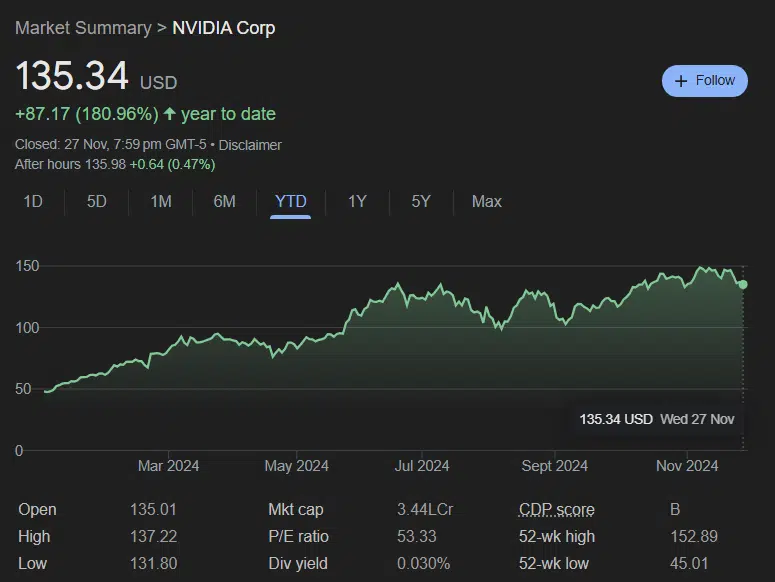Following a quarterly sales report from Nvidia that exceeded expectations, AI-focused cryptocurrencies experienced a surge in value over the past week
At press time, NEAR Protocol, the largest AI coin by market cap, was trading at $6.67 per coin, a 20% increase over the past seven days. In the same period, Internet Computer, Bittensor, FET, and SingularityNET achieved gains of 26.4%, 20.6%, 20.4%, and 21.7%, respectively.
At the same time, other AI tokens, including Qubic (QUBIC), Virtuals Protocol (VIRTUAL), Grass, and Livepeer, achieved significantly greater gains of 79.5%, 61%, 58%, and 41.9%, respectively.
The total market capitalization of AI coins reached an all-time high of $42.19 billion as a result of these gains.
Nvidia’s third-quarter earnings report, which reported record quarterly sales of $35.1 billion, surpassed earlier estimates of $32.5 billion, sparked a rally in the AI sector.
Jensen Huang, the CEO of Nvidia, highlighted a substantial increase in demand for the company’s most recent Blackwell chip during the third-quarter Investor Call.
He also stated that the increase in demand has increased the likelihood of surpassing the previous estimate of $7 billion in revenue for Q4 2025.
Nvidia’s stock has increased by more than 180% this year, nearly tripling in value, as a result of its dedication to accelerated computing technologies and generative AI, as well as robust sales growth.

Citi analysts have designated Nvidia as a “positive catalyst watch,” anticipating that its shares may increase by up to 27% to a $175 price target within the next 90 days. This prediction is based on the increasing sales of Blackwell chips as 2025 approaches.
As previously reported by Crypto.news, AI-related cryptocurrencies frequently experience a surge in value in response to positive news regarding Nvidia. This was the case in November, when several of these tokens experienced gains after Nvidia momentarily surpassed Apple as the world’s most valuable company.
This time, AI-related coins have also benefited from policy shifts under the U.S. administration, which have plans to appoint a “AI czar” to centralize artificial intelligence policy and bolster the nation’s leadership in transformative technology.












